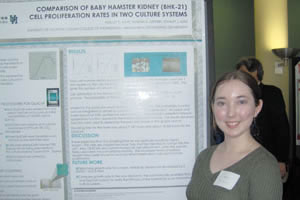Students from the Cullen College of Engineering gave poster presentations outlining the research they conducted over the summer during the University of Houston’s recent Undergraduate Research Day.
The event, held on Oct. 18, featured students who participated in the university’s Summer Undergraduate Research Fellowship program. Under the program, fellowship recipients are given a $2,800 stipend to conduct research for ten weeks during the summer under the supervision of a university faculty member.
According to Donald Birx, vice chancellor for research, such research is valuable as an educational tool and as a bridge between the academia and the professional world.
“A strong undergraduate research program is an effective link between the intellectual environment of academia, the processes of discovery – whether science or the humanities – and the needs of industry and our global community,” he said. “It opens the gates of opportunity for a diverse population. The state and region that address this topic with enthusiasm will lead the country and position itself competitively in the global economy for years to come.”
A total of 47 undergraduates participated in the program this summer, including students from the STEM fields, social sciences, humanities and fine arts. With 15 participants, the Cullen College of Engineering had more fellowship recipients than any other degree-granting college at the university.
Research projects undertaken by engineering students included the development of fiber optics-based sensors to measure the structural integrity of buildings, optical imaging of brain activity and the creation of gold nano-devices to be used for drug delivery.
According to the fellowship recipients, conducting research allowed them to not only learn about the subject they were studying, but to experience a new way of learning, as well as a key element of the discipline of engineering.
One of the most common realizations among engineering students in the program was that conducting research requires large reserves of patience. Many students said that their work during the summer was ongoing and had not yet resulted definite conclusions or results.
The students also said that they enjoyed interacting with their faculty mentors in a collaborative environment. According to Holley Love, a biomedical engineering major who worked with Professor Stanley Kleis to develop a new type of cell-culture system, conducting research allowed her at times to work with her professor more as a colleague than as a student.
"Instead of being graded and taught, I got to teach [my faculty mentor] about what my research showed,” she said. “I enjoyed working with my professor on that level.”
